- Home
- P. D. James
Death in Holy Orders Page 2
Death in Holy Orders Read online
Page 2
We were both silent for a moment, kneeling there on each side of him. We must have looked as if we were praying, and I would have said a prayer for him only I couldn’t think of the right words. And then the sun came out and suddenly the scene looked as if it wasn’t real, as if the two of us were being photographed in colour. Everything was bright and clear-edged. The grains of sand on Ronald’s hair shone like pin-points of light.
Mr. Gregory said, “We must get some help, call the police. Do you mind waiting here with him? I won’t be long. Or you can come with me if you prefer, but I think it would be better if one of us stayed.”
I said, “You go. You’ll be quicker in the car. I don’t mind waiting.”
I watched him as he walked as briskly as the shingle allowed towards the mere, then round the promontory and out of sight. A minute later I heard the sound of the car as he drove towards the college. I half-slid down the sand a little way from the body and settled myself on the pebbles, wriggling to make myself more comfortable and digging in my heels. The pebbles beneath the surface were still damp from the night rain and the cold wetness seeped through the cotton of my slacks. I sat with my arms folded round my knees, looking out over the sea.
And sitting there I thought of Mike for the first time in years. He was killed when his motorcycle skidded off the Ai and into a tree. We had been home from our honeymoon for less than two weeks; we had known each other for less than a year. What I felt at his death was shock and disbelief, not grief. I thought at the time that it was grief but I know better now. I was in love with Mike but I didn’t love him. That comes with living together and caring for each other and we never had the time. After he died I knew that I was Margaret Munroe, widow, but I felt that I was still Margaret Parker, spinster, aged twenty-one, a recently qualified nurse. When I discovered I was pregnant, that too seemed unreal. The baby, when he arrived, seemed nothing to do with Mike or our brief time together, and nothing to do with me. All that came later and perhaps it was the stronger because it came late. When Charlie died I mourned for both of them, but I still can’t clearly recall Mike’sface.
I was aware of Ronald’s body behind me, but it was a comfort not to be sitting at his side. Some people taking watch beside the dead find their presence companionable, but I didn’t feel that, not with Ronald. All I felt was a great sadness. It wasn’t for that poor boy, it wasn’t even for Charlie or Mike or for myself. It was a universal sadness which seemed to permeate everything round me, the fresh breeze against my cheek, the sky where there were a few massed clouds moving almost deliberately, it seemed, across the blue, and the sea itself. I found myself thinking of all the people who had lived and died on this coast, and of the bones lying a mile out under the waves in the great churchyards. Their lives must have mattered at the time to themselves and the people who cared about them, but now they were dead and it would have been just the same if they had never lived. In a hundred years no one will remember Charlie, Mike or me. All our lives are as insignificant as a single grain of sand. My mind felt emptied, even of sadness. Instead, gazing out to sea, accepting that in the end nothing really matters and that all we have is the present moment to endure or enjoy, I felt at peace.
I suppose I was sitting in a kind of trance because I didn’t see or hear the three approaching figures until there was the loud crunch of shingle and they had almost reached me. Father Sebastian and Mr. Gregory were trudging side by side. Father Sebastian had wrapped his black cloak tightly round him against the wind. Both their heads were bent and they walked purposefully as if they were marching. Father Martin was a little way behind, lurching as he struggled with difficulty over the shingle. I remember thinking that it was unkind of the other two not to wait for him.
I felt embarrassed to be discovered sitting. I got up, and Father Sebastian said, “Are you all right, Margaret ?”
I said, “Yes Father’, and then stood aside as the three of them walked up to the body.
Father Sebastian made the sign of the cross, then said, “This is a disaster.”
Even at the time I thought it was a strange word to use and I knew that he wasn’t just thinking at that moment of Ronald Treeves; he was thinking of the college.
He bent down and put his hand against the back of Ronald’s neck and Mr. Gregory said, quite sharply, “He’s dead of course. Better not disturb the body any further.”
Father Martin was standing a little apart. I saw his lips moving and I think he was praying.
Father Sebastian said, “If you, Gregory, will go back to the college and watch for the police, Father Martin and I will stay here. Margaret had better go with you. This has been a shock for her. Take her to Mrs. Pilbeam, if you will, and explain what’s happened. Mrs. Pilbeam will make her some hot tea and look after her. Neither of them are to say anything until I inform the college. If the police want to talk to Margaret they can do so later.”
It’s funny, but I remember feeling a slight sense of resentment that he had spoken to Mr. Gregory almost as if I wasn’t there. And I didn’t really want to be taken to Ruby Pilbeam’s cottage. I like Ruby, who has always managed to be kind without being interfering, but all I wanted was to go home.
Father Sebastian came up and laid a hand on my shoulder. He said, “You’ve been very brave, Margaret, thank you. Go with Mr. Gregory now and I’ll come to see you later. Father Martin and I will sit here with Ronald.”
It was the first time he had spoken the boy’s name.
In the car Mr. Gregory drove for a few minutes in silence, then said, “That’s a curious death. I wonder what the Coroner or, come to that, the police will make of it.”
I said, “Surely it was an accident.”
“A curious accident, wouldn’t you say?” I didn’t reply, then he said, “This isn’t the first dead body you’ve seen, of course. You’ll be accustomed to death.”
“I’m a nurse, Mr. Gregory.”
I thought of the first body I’d seen all those years ago as an eighteen-year-old probationer, the first body I’d laid out. Nursing was different in those days. We used to lay out the dead ourselves and it was done with great reverence and in silence behind the screens. My first ward sister used to join us to say a prayer before we began. She told us that this was the last service we could render our patients. But I wasn’t going to talk to Mr. Gregory about that.
He said, “Seeing a dead body, any body, is a comforting reassurance that we may live as men but we die as animals. Personally I find that a relief. I can’t imagine any greater horror than eternal life.”
I still didn’t reply. It’s not that I dislike him: we hardly ever meet. Ruby Pilbeam cleans his cottage once a week and does his washing. It’s a private arrangement they have. But he and I have never been on chatting terms and I wasn’t in the mood to begin now.
The car turned westward between the twin towers and into the courtyard. Releasing his seatbelt and helping me with mine, he said, “I’ll walk with you to Mrs. Pilbeam’s. She may not be in. If not, you had better come to my cottage. What we both need is a drink.”
But she was in and I was glad of it after all. Mr. Gregory reported the facts very briefly and said, “Father Sebastian and Father Martin are with the body now and the police will arrive very soon. Please don’t mention this to anyone else until Father Sebastian returns. He’ll then speak to the whole college.”
After he had gone Ruby did indeed make tea, hot and strong and very comforting. She fussed over me but I can’t remember the words or the gestures. I didn’t say much but she didn’t expect me to. She treated me as if I were ill, settling me in one of the easy chairs before the fireplace, switching on two bars of the electric fire in case I felt cold with shock, and then drawing the curtains so that I could have what she described as ‘a good long rest’.
I suppose it was about an hour before the police arrived, a youngish sergeant with a Welsh accent. He was kind and patient and I answered his questions quite calmly. There wasn’t, after all, very much to tell.
He asked me how well I’d known Ronald, the last time I’d seen him and whether he’d been depressed lately. I said I’d last seen him the previous evening walking towards Mr. Gregory’s cottage, I suppose for his Greek lesson. Term had only just started and that’s all I had seen of him. I got the impression that the police sergeant I think his name was Jones or Evans, a Welsh name anyway was sorry he’d asked the question about Ronald being depressed. Anyway, he said that it all looked quite straightforward, asked Ruby the same questions and then left.
Father Sebastian broke the news of Ronald’s death to the whole college when they assembled before five o’clock Evensong. Most of the ordinands had guessed by then that something tragic had happened; police cars and a mortuary van don’t arrive in secret. I didn’t go to the library so I never heard what Father Sebastian said. All I wanted by then was to be alone. But later in the evening the senior student, Raphael Arbuthnot, brought me a small pot of blue African violets with the sympathy of all the ordinands. One of them must have driven into Pakefield or Lowestoft to buy them. When he gave them to me, Raphael bent down and kissed my cheek. He said, “I’m so sorry, Margaret.” It was the kind of thing people say at a time like that, but it didn’t sound commonplace. What it sounded like was an apology.
It was two nights later that the nightmares began. I have never suffered from nightmares before, not even when I was a student nurse and first encountered death. The dreams are horrible, and now I sit in front of the television until late every evening, dreading the moment when tiredness drives me to bed. The dream is always the same. Ronald Treeves is standing beside the bed. He is naked and his body is plastered with damp sand. It is matted in his fair hair and over his face. Only the eyes are free of sand, and they gaze at me reproachfully as if asking why I didn’t do more to save him. I know that there was nothing I could have done. I know that he was dead long before I came upon his body. But still he appears night after night, with that accusing reproachful gaze, the damp sand falling in clumps from his plain, rather pudgy face.
Perhaps now that I have written it down he will leave me in peace. I don’t think I am a fanciful woman, but there is something strange about his death, something I ought to remember but which lies nagging at the back of my mind. Something tells me that Ronald Treeves’s death wasn’t an end but a beginning.
The call to Dalgliesh came at ten-forty a.m.” just before he returned to his office after a meeting with the Community Relations Branch. It had gone on later than scheduled such meetings invariably did -and there were only fifty minutes before he was due to join the Commissioner in the Home Secretary’s office at the House of Commons. Time, he thought, for a coffee and to make a couple of outstanding telephone calls. But he had hardly reached his desk when his PA put her head round the office door.
“Mr. Harkness would be grateful if you would see him before you leave. He’s got Sir Aired Treeves with him.”
So now what? Sir Aired wanted something, of course; people who came to see senior officers of the Yard usually did. And what Sir Aired wanted he invariably got. You didn’t run one of the most prosperous multinational corporations without knowing instinctively how to control the intricacies of power, in small matters as in large. Dalgliesh knew of his reputation; you could hardly live in the twenty-first century and be ignorant of it. A fair, even generous employer of successful staff, a liberal supporter of charities from his trust funds, a respected collector of twentieth-century European art; all of which could be translated by the prejudiced as a ruthless primer of failures, a well-advertised supporter of fashionable causes and an investor with an eye for long-term capital gain. Even his reputation for rudeness was ambiguous. Since it was indiscriminate and the powerful suffered with the weak it had merely gained him an admirable reputation for honest egalitarianism.
Dalgliesh took the lift to the seventh floor with little expectation of pleasure but considerable curiosity. At least the meeting would be relatively short; he would have to leave by quarter-past to walk that convenient half-mile to the Home Office. When it came to priorities, the Home Secretary took precedence over even Sir Aired Treeves.
The Assistant Commissioner and Sir Aired were standing by Harkness’s desk and both turned to face Dalgliesh as he entered. As often with people who feature prominently in the media, the first impression of Treeves was disconcerting. He was stockier and less ruggedly handsome than he appeared on television, the facial contour less defined. But the impression of latent power and a certain self-conscious enjoyment of it was even stronger. It was his foible to dress as a prosperous farmer: except on the most formal occasions he wore well-tailored tweeds. There was indeed something of the countryman about his person: the broad shoulders, the burnish on the cheeks and over the prominent nose, the unruly hair that no barber could entirely discipline. It was very dark, almost black, with a silver streak swept back from the middle of the forehead. In a man more concerned with his appearance, Dalgliesh could have suspected that it had been dyed.
As Dalgliesh entered, Treeves’s glance under his bushy eyebrows was direct and frankly appraising.
Harkness said, “I think you know each other.”
They shook hands. Sir Alred’s hand was cold and strong but he withdrew it at once as if to emphasize that the gesture had been a formality. He said, “We have met. A Home Office conference in the late eighties, wasn’t it? On policy in the inner cities. I don’t know why I got mixed up in it.”
“Your Corporation made a generous donation to one of the schemes organized under the inner cities initiatives. I think you wanted to satisfy yourself that it was likely to be usefully spent.”
“I dare say. Not much chance of that. Young people want well-paid jobs worth getting up in the morning for, not training for work that doesn’t exist.”
Dalgliesh recalled the occasion. It had been the usual highly organized public relations exercise. Few of the senior officers or ministers present had expected much to come of it, and little had. Treeves, he remembered, had asked a number of pertinent questions, had expressed scepticism at the answers and had left before the Minister’s summing up. Why exactly had he chosen to attend, chosen indeed to contribute? Perhaps that, too, had been a public relations exercise.
Harkness made a vague gesture towards the black swivel chairs ranged in front of the window and murmured something about coffee.
Treeves said, curtly, “No thank you, I won’t take coffee.” His tone implied that he had been offered an esoteric beverage inappropriate to ten forty-five in the morning.
They seated themselves with something of the portentous wariness of three Mafia bosses meeting to settle their several spheres of interest. Treeves looked at his watch. Specific time had no doubt been allowed for this encounter. He had come at his own convenience with no prior notice and no forewarning of what he had in mind. That, of course, had given him the advantage. He had arrived with every confidence that a senior officer would find time for him, and he had been right.
Now he said, “My elder son, Ronald he was adopted by the way -was killed ten days ago in a cliff fall in Suffolk. Sand fall would be a more accurate description; those cliffs south of Lowestoft have been eaten away by the sea since the seventeenth century. He was suffocated. Ronald was a student at St. Anselm’s Theological College at Ballard’s Mere. It’s a High Church establishment for the training of Anglican priests. Smells and bells.” He turned to Dalgliesh.
“You know about this sort of thing, don’t you? Wasn’t your father a parson?”
And how, Dalgliesh wondered, did Sir Aired know that? Probably at some time he’d been told it, half-recalled the fact and asked one of his minions to check before setting out for this meeting. He was a man who believed in having as much information as possible about the people with whom he was to deal. If it was to their discredit so much the better, but any personal detail that the other party didn’t know he possessed was a satisfying and potentially useful accession of power.
Dalgliesh said, “He was
a Norfolk rector, yes.”
Harkness asked, “Your son was training for the ministry?”
“I’m not aware that what he was being taught at St. Anselm’s would have qualified him for any other job.”
Dalgliesh said, “There was a mention of the death in the broad sheets but I don’t remember reading about the inquest.”
“You wouldn’t. It was kept pretty quiet. Accidental death. It should have been an open verdict. If the Warden of the college and most of the staff hadn’t been sitting there like a row of black-gowned vigilantes the Coroner would probably have found the courage to return a proper verdict.”
“You were there, Sir Aired?”
“No. I was represented but I was in China. There was a complicated contract to be negotiated in Beijing. I came back for the cremation. We brought the body back to London for that. They had some kind of memorial service a requiem I think they called it at St. Anselm’s, but neither my wife nor I attended. It’s not a place where I ever felt at home. Immediately after the inquest I arranged for my chauffeur with another driver to collect Ronald’s Porsche, and the college handed over his clothes, his wallet and his watch. Norris he’s my driver brought back the parcel. There wasn’t much. The students aren’t encouraged to have more than the minimum of clothes, a suit, two pairs of jeans with the usual shirts and pullovers, shoes and that black cassock which the students are required to wear. He had some books, of course, but I told the college that they could have those for the library. It’s odd how quickly you can tidy away a life. Then two days ago I received this.”
Unhurriedly he took out his wallet and unfolded a sheet of paper, then passed it to Dalgliesh. Dalgliesh glanced at it, and handed it to the Assistant Commissioner. Harkness read it aloud.
““Why don’t you ask some questions about your son’s death? Nobody really believes it was an accident. Those priests will cover up anything to keep their good name. There are a number of things going on in that college which ought to be brought into the light. Are you going to let them get away with it?”

 The Skull Beneath the Skin
The Skull Beneath the Skin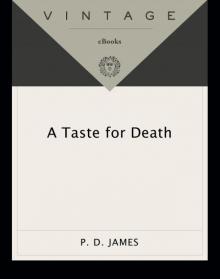 A Taste for Death
A Taste for Death The Children of Men
The Children of Men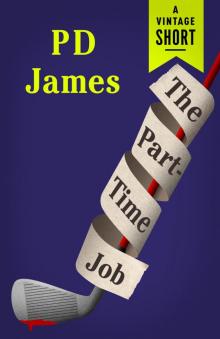 The Part-Time Job
The Part-Time Job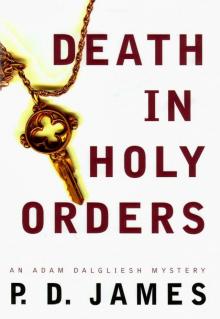 Death in Holy Orders
Death in Holy Orders The Victim
The Victim Shroud for a Nightingale
Shroud for a Nightingale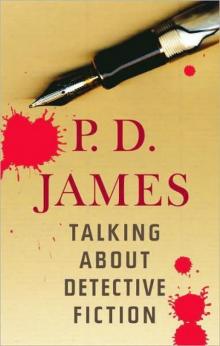 Talking about Detective Fiction
Talking about Detective Fiction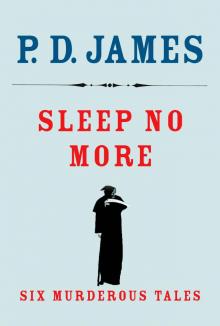 Sleep No More
Sleep No More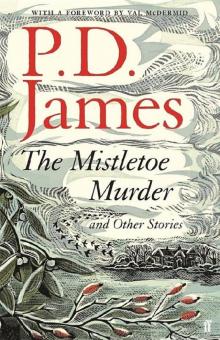 The Mistletoe Murder and Other Stories
The Mistletoe Murder and Other Stories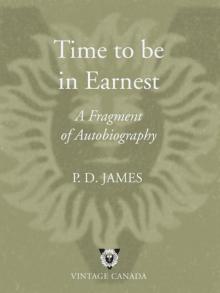 Time to Be in Earnest
Time to Be in Earnest Original Sin
Original Sin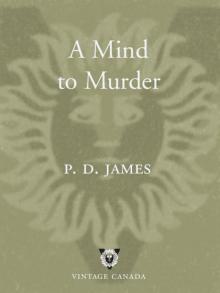 A Mind to Murder
A Mind to Murder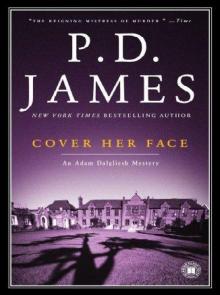 Cover Her Face
Cover Her Face Innocent Blood
Innocent Blood Devices and Desires
Devices and Desires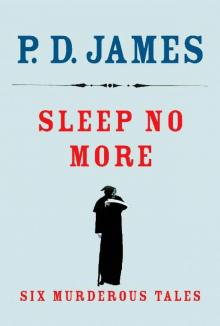 Sleep No More: Six Murderous Tales
Sleep No More: Six Murderous Tales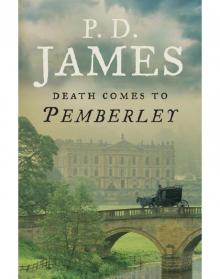 Death Comes to Pemberley
Death Comes to Pemberley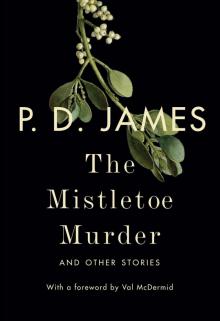 The Mistletoe Murder
The Mistletoe Murder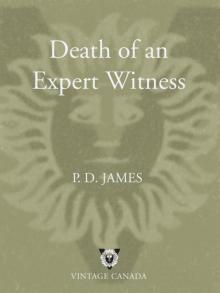 Death of an Expert Witness
Death of an Expert Witness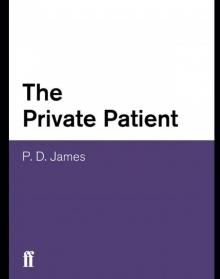 The Private Patient
The Private Patient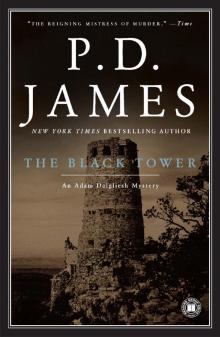 The Black Tower
The Black Tower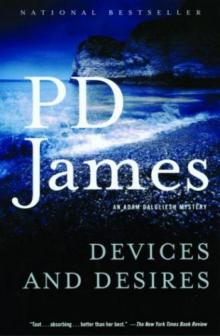 Devices & Desires - Dalgleish 08
Devices & Desires - Dalgleish 08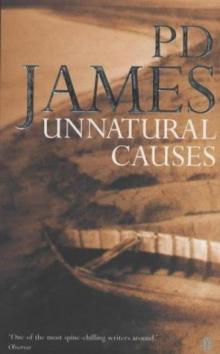 Unnatural Causes
Unnatural Causes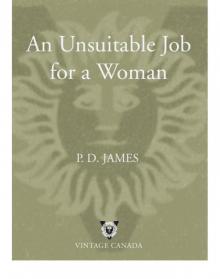 An Unsuitable Job for a Woman
An Unsuitable Job for a Woman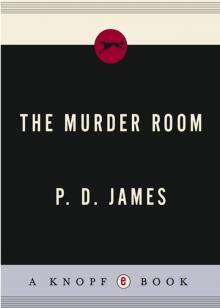 The Murder Room
The Murder Room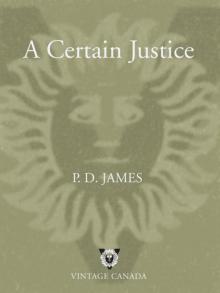 A Certain Justice
A Certain Justice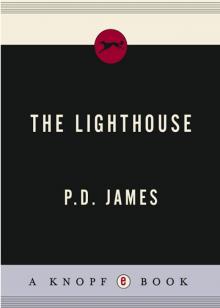 The Lighthouse
The Lighthouse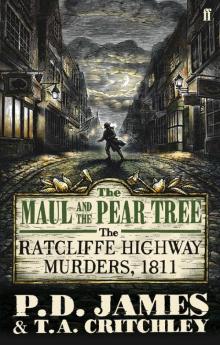 The Maul and the Pear Tree
The Maul and the Pear Tree